
Christian terminology and theological views of marriage vary by time period, by country, and by the different Christian denominations.

Olga was a regent of Kievan Rus' for her son Sviatoslav from 945 until 957. Following her baptism, Olga took the name Elenа. She is known for her subjugation of the Drevlians, a tribe that had killed her husband Igor. Even though it was her grandson Vladimir who adopted Christianity and made it the state religion, she was the first ruler to be baptized.
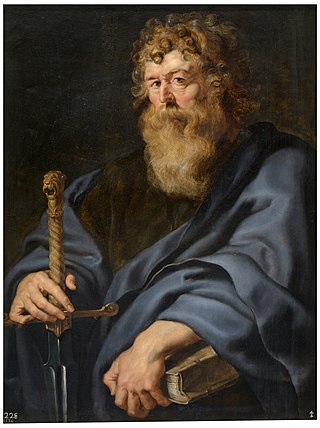
Paul also named Saul of Tarsus, commonly known as Paul the Apostle and Saint Paul, was a Christian apostle who spread the teachings of Jesus in the first-century world. For his contributions towards the New Testament, he is generally regarded as one of the most important figures of the Apostolic Age, and he also founded several Christian communities in Asia Minor and Europe from the mid-40s to the mid-50s AD.
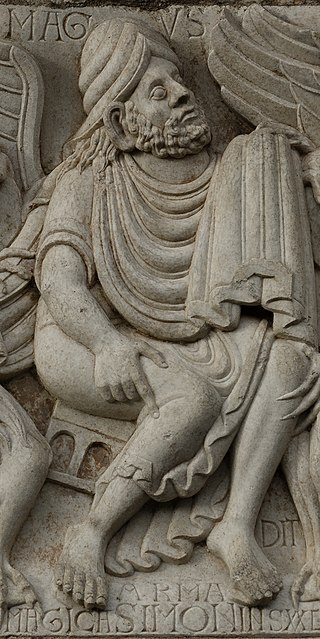
Simon Magus, also known as Simon the Sorcerer or Simon the Magician, was a religious figure whose confrontation with Peter is recorded in the Acts of the Apostles. The act of simony, or paying for position, is named after Simon, who tried to buy his way into the power of the Apostles.

Quo Vadis: A Narrative of the Time of Nero is a historical novel written by Henryk Sienkiewicz in Polish.

Priscilla and Aquila were a first-century Christian missionary married couple described in the New Testament. Aquila is traditionally listed among the Seventy Disciples. They lived, worked, and traveled with the Apostle Paul, who described them as his "fellow workers in Christ Jesus".
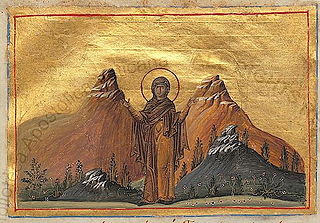
Thecla was a saint of the early Christian Church, and a reported follower of Paul the Apostle. The earliest record of her life comes from the ancient apocryphal Acts of Paul and Thecla.

The Acts of Paul and Thecla is an apocryphal text describing Paul the Apostle's influence on a young virgin named Thecla. It is one of the writings of the New Testament apocrypha. Edgar J. Goodspeed called it a "religious romance".
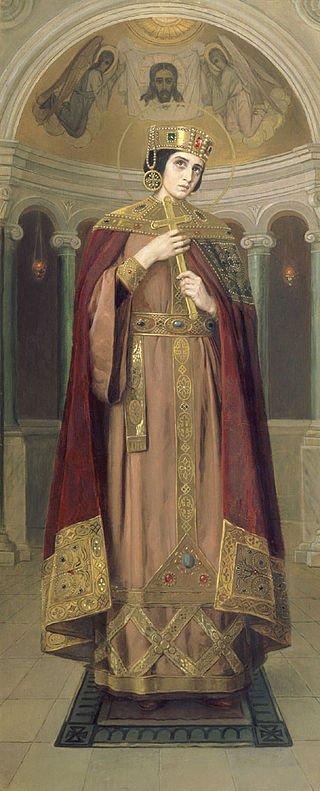
Alexandra of Rome was a Christian martyr and saint, known from Martyrdom of Saint George as either Emperor Diocletian's wife or the wife of Dacian, a Roman Prefect. She is also sometimes mistaken with Priscilla or Prisca.

Saints Chrysanthus and Daria are saints of the Early Christian period. Their names appear in the Martyrologium Hieronymianum, an early martyrs list, and a church in their honour was built over their reputed grave in Rome.

The Pauline privilege is the allowance by the Roman Catholic Church of the dissolution of marriage of two persons not baptized at the time the marriage occurred. The Pauline privilege is drawn from the apostle Paul's instructions in the First Epistle to the Corinthians.

Lydia of Thyatira is a woman mentioned in the New Testament who is regarded as the first documented convert to Christianity in Europe. Several Christian denominations have designated her a saint.

Women have played important roles in Christianity especially in marriage and in formal ministry positions within certain Christian denominations, and parachurch organizations. In 2016, it was estimated that 52–53 percent of the world's Christian population aged 20 years and over was female, with this figure falling to 51.6 percent in 2020. The Pew Research Center studied the effects of gender on religiosity throughout the world, finding that Christian women in 53 countries are generally more religious than Christian men, while Christians of both genders in African countries are equally likely to regularly attend services.
Christianity began as a Second Temple Judaic sect in the 1st century in the Roman province of Judea, from where it spread throughout and beyond the Roman Empire.
Jason of Thessalonica, also known as Jason of Tarsus, was a Jewish convert and early Christian believer mentioned in the New Testament in Acts 17:5–9 and Romans 16:21.
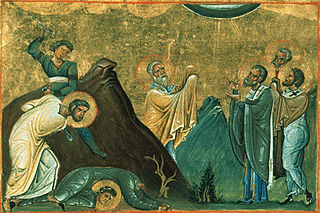
Sosipater is a person mentioned in the New Testament, in Romans 16:21. He is probably the same person as Sopater mentioned in Acts 20:4.

Christianity in the 1st century covers the formative history of Christianity from the start of the ministry of Jesus to the death of the last of the Twelve Apostles and is thus also known as the Apostolic Age. Early Christianity developed out of the eschatological ministry of Jesus. Subsequent to Jesus' death, his earliest followers formed an apocalyptic messianic Jewish sect during the late Second Temple period of the 1st century. Initially believing that Jesus' resurrection was the start of the end time, their beliefs soon changed in the expected Second Coming of Jesus and the start of God's Kingdom at a later point in time.

Acts 10 is the tenth chapter of the Acts of the Apostles in the New Testament of the Christian Bible. The book containing this chapter is anonymous but early Christian tradition uniformly affirmed that Luke composed this book as well as the Gospel of Luke. This chapter records the vision of Saint Peter and his meeting with Cornelius in Caesarea.
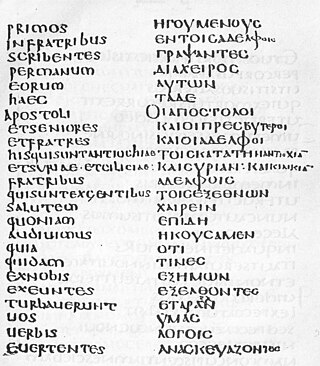
Acts 16 is the sixteenth chapter of the Acts of the Apostles in the New Testament of the Christian Bible. It records the start of the second missionary journey of Paul, together with Silas and Timothy. The book containing this chapter is anonymous, but early Christian tradition uniformly affirmed that Luke composed this book as well as the Gospel of Luke.

Paul, Apostle of Christ is a 2018 American biblical drama film written and directed by Andrew Hyatt. It stars James Faulkner as Paul the Apostle and Jim Caviezel as Saint Luke.




















